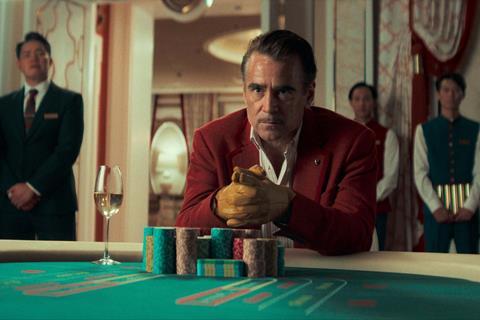Tilda Swinton also stars in the director’s Macao-set follow up to ‘All Quiet On The Western Front’ and ‘Conclave’

Dir: Edward Berger. UK. 2025. 103mins
Ballad Of A Small Player is a gambling film that overplays its hand. Edward Berger’s hyper-stylish adaptation of Lawrence Osborne’s 2014 novel stars a queasily compelling Colin Farrell as an Irishman with a shady past hiding out in Macao, pretending to be a high-roller. Playfully, almost proudly shallow as it feeds off the feverish highs and lows of its addicted protagonist, this neo-noir offers plenty of buzzy delight — that is, until the story’s pretensions bring down the whole house of cards.
The picture’s tone-poem intoxication starts to grow stale
Screening in Telluride and Toronto, the film will open theatrically in the US on October 15 and in the UK two days later before streaming on Netflix starting October 29. Berger’s last two features, All Quiet On The Western Front and Conclave, were major awards-season players, but this new, less overtly ‘prestige’ picture may have a tougher time courting voters. Still, a roguish Farrell will raise Ballad’s profile, and he’s joined by Tilda Swinton as the oddball investigator on his character’s trail.
Lord Doyle (Farrell) is a solitary, mustachioed man living in an opulent hotel room in Macau, spending most of his waking hours playing baccarat at the casino. But Doyle’s luck has been miserable of late, and he desperately needs a hot streak to pay off the vast sums he owes the hotel lest management kick him out. Adding to his worries is the arrival of Cynthia (Swinton), who has been hired to collect the money he stole as part of his murky life back in England.
Draped in blinding-white fluorescent lights and vibrant neon, Ballad imagines Macau’s vast gambling mecca as a decadent, alien fantasyland, with every gliding tracking shot and canted angle heightening the surrealism of this extreme locale. Aided by All Quiet On The Western Front cinematographer James Friend, the director’s extravagant visual approach makes every super-saturated scene pop – even if Rowan Joffe’s screenplay doesn’t have much new to say about the chokehold that gambling addiction has on its victims.
Doyle decks himself out in flamboyant suits and slicks back his lustrous hair, carefully manufacturing an elegant-bachelor persona for the world. Quickly, though, we recognise how hollow that packaging is — and are not surprised in the least to eventually discover that Lord Doyle is not his actual name. Suffering from debilitating panic attacks, drinking far too much, and down to his last few dollars, Doyle is a drowning man failing to keep his head above water.
As the stakes keep getting raised, Farrell grows more frenetic and sweaty, almost as if the screaming anxiety the gambler is trying to keep bottled up might rip him apart at any moment. His magnetic performance contains occasional hints of comic exasperation alongside a lizard-y charm as the character tries to sweet-talk his way out of his latest jam. Often, Doyle turns to the one sympathetic soul in his life, casino employee Dao Ming (Fala Chen), who has a wary affection for this handsome scoundrel.
In truth, the outside forces demanding their money are often of secondary importance to Ballad’s real purpose, which is to marvel at an inveterate liar convinced the faux-suave raconteur he’s peddling could some day be the real him. In limited doses, Berger’s intentionally showy approach deftly mirrors Doyle’s swaggering artifice, the film and the character feeding off each other. Ballad wants us to embrace Doyle as a moody antihero, the debt collectors hot on his heels an outward manifestation of the buried demons he’s been running away from for years.
But the picture’s tone-poem intoxication starts to grow stale, the thin story burdened by late-reel twists that strain to add gravitas to the proceedings. Plus, once the audience learns Doyle’s secrets, Ballad loses its air of mystery, leaving us with just one more tale of a luckless gambler stumbling toward his shot at redemption. As for the overly mousy Cynthia, the antagonistic character grants the ever-shapeshifting Swinton an opportunity to try on yet another quirky affectation, complete with bad hair, droopy socks and unflattering eyeglasses. It’s a very mannered turn — and certainly not one of her best bets.
Production companies: Good Chaos, Nine Hours
Worldwide distribution: Netflix
Producers: Mike Goodridge, Edward Berger, Matthew James Wilkinson
Screenplay: Rowan Joffe, based on the novel by Lawrence Osborne
Cinematography: James Friend
Production design: Jonathan Houlding
Editing: Nick Emerson
Music: Volker Bertelmann
Main cast: Colin Farrell, Fala Chen, Deanie Ip, Alex Jennings, Tilda Swinton















![[L-R]: Amanda Villavieja, Laia Casanovas, Yasmina Praderas](https://d1nslcd7m2225b.cloudfront.net/Pictures/274x183/6/4/1/1471641_pxl_20251224_103354743_618426_crop.jpg)








